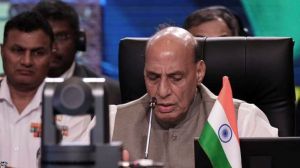NKorea threatens to expand nuclear arsenal
North Korea issued a veiled threat to increase its nuclear arsenal if US officials do not quickly agree to the one-on-one talks that the communist regime is demanding.
North Korea issued a veiled threat to increase its nuclear arsenal if US officials do not quickly agree to the one-on-one talks that the communist regime is demanding.
The regime’s impatience came days after its No 2 nuclear negotiator Ri Gun came away from meetings with Washington envoy Sung Kim without an agreement to hold bilateral talks.
“If the US is not ready to sit at a negotiating table with the (North),it will go its own way,” the North’s Foreign Ministry said Monday in a statement carried by Pyongyang’s official Korean Central News Agency.
The statement did not elaborate,but it was widely seen as a warning that the North will bolster its nuclear stockpile – a brinksmanship tactic that the communist nation has often employed.
In Washington,State Department spokesman Ian Kelly did not comment on the North’s statement,though he told reporters Monday that Kim “had very useful discussions” with Ri.
He also said the US is “still considering” North Korea’s invitation for Stephen Bosworth,the US special envoy on North Korea,to visit Pyongyang for talks.
In September,the North said it was “weaponizing” plutonium,a key ingredient for nuclear bombs,and that it had succeeded in uranium enrichment,which would give the regime a second way to make atomic bombs. That was also seen as a pressure tactic aimed at getting Washington to agree to one-on-one negotiations.
North Korea has mixed such threats with a series of conciliatory moves,such as releasing two detained American journalists,after months of raising tensions with nuclear and missile tests. The North has also quit the six-nation nuclear disarmament talks – which involve China,Japan,Russia,the US and the two Koreas.
North Korea and the US fought on opposite sides of the Korean War of the 1950s and do not have diplomatic relations. Both nations have tanks and troops on guard at the heavily fortified border dividing the two Koreas.
Pyongyang claims it must develop atomic weapons to defend itself against nuclear threats from the US The regime has long sought direct negotiations with Washington saying it was because of US
nuclear threats that the country develop nuclear bombs.
Washington has denied it has any intention of attacking the North. But Defense Secretary Robert Gates assured Seoul last month that Washington was prepared to unleash all military capabilities – including its nuclear might – to defend the longtime ally.
Pyongyang’s main Rodong Sinmun newspaper blasted Gates’ remarks,saying the US is trying to provoke a nuclear war on the Korean peninsula.
The paper said in a commentary carried by KCNA that the North’s “nuclear deterrent will be bolstered” if the US refuses to switch its “policy of aggression” toward the North.
On Monday,the North’s ministry also said that “meaningful progress” on a nuclear-free Korean peninsula is possible – “if the hostile relations between the (North) and the US are settled and confidence is built between them.”
Washington has maintained that it is willing to engage North Korea in bilateral talks – if they lead to the resumption of the stalled six-nation disarmament talks.
North Korea’s Ri,who was in the US at the invitation of private organizations,said discussions with the US envoy were “useful,” South Korea’s Yonhap news agency reported. Still,both KCNA and State Department officials in Washington said no decision had been made on holding bilateral talks.
The North agreed in 2007 to disable its nuclear facilities – as a step toward its ultimate dismantlement – in exchange for energy aid and political concessions. Pyongyang halted the process and later abandoned the pact after receiving most of the promised energy aid and concessions.
The standoff led to Pyongyang conducting its second nuclear test and banned missile tests earlier this year.






- 01
- 02
- 03
- 04
- 05

























